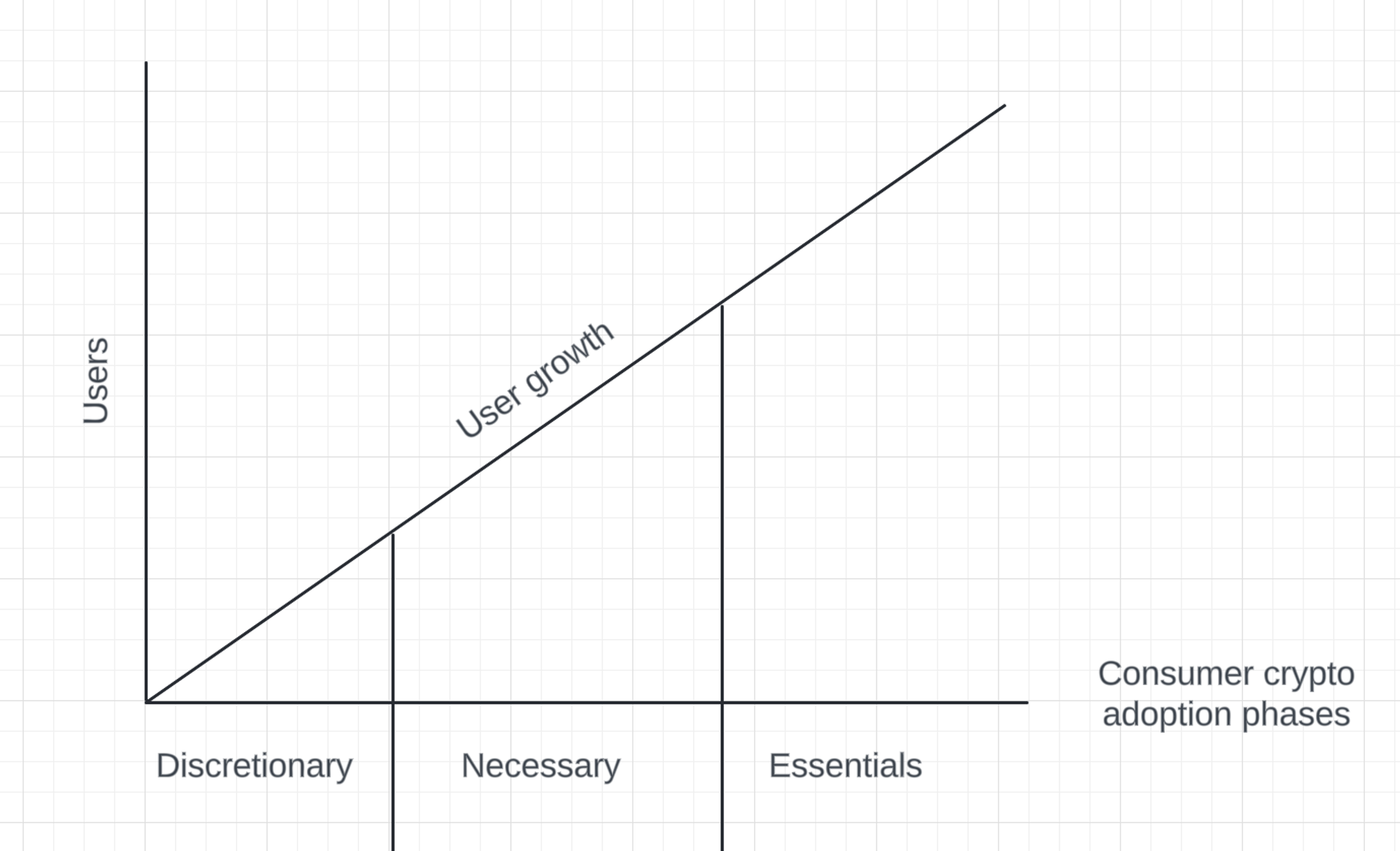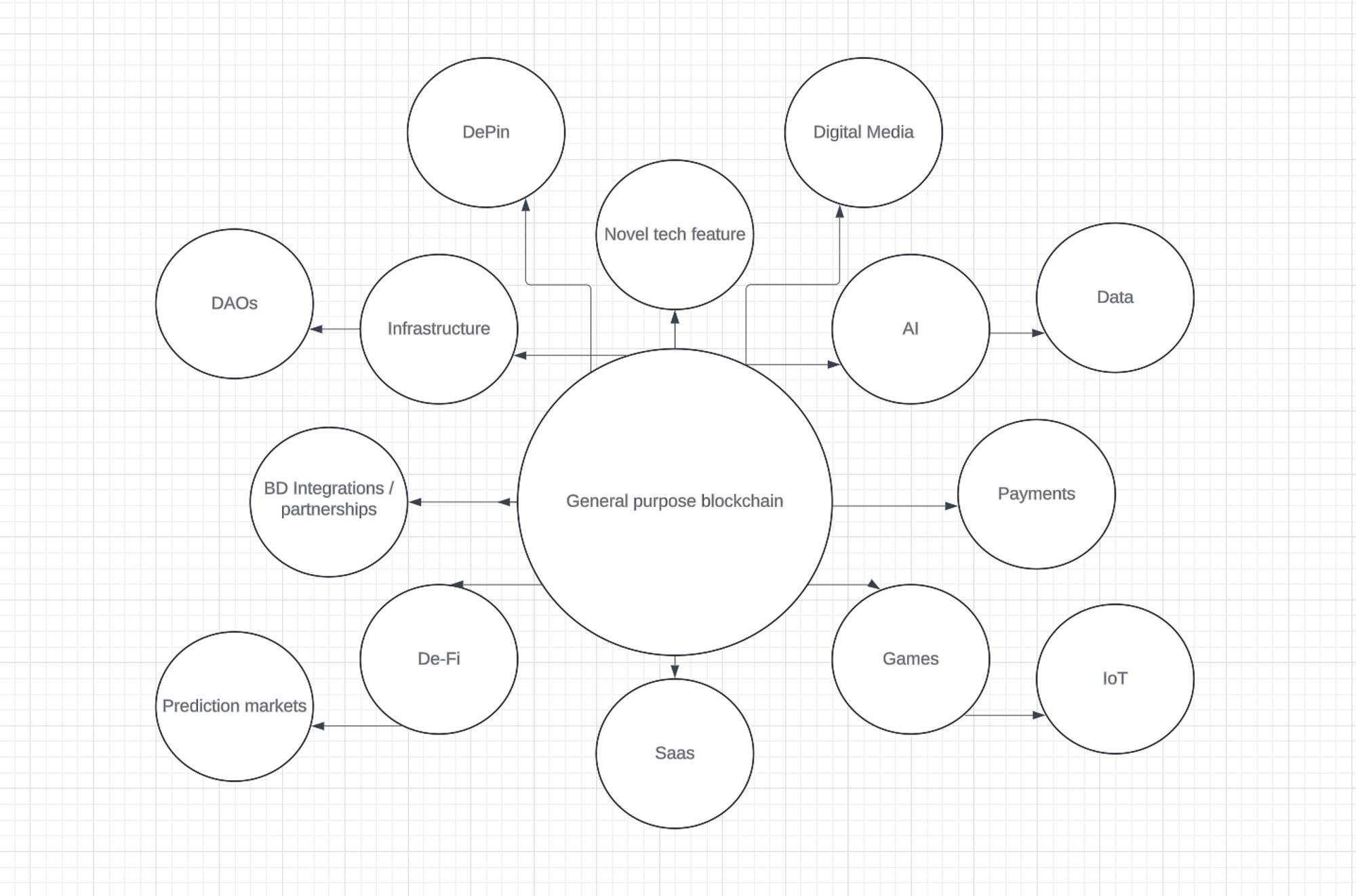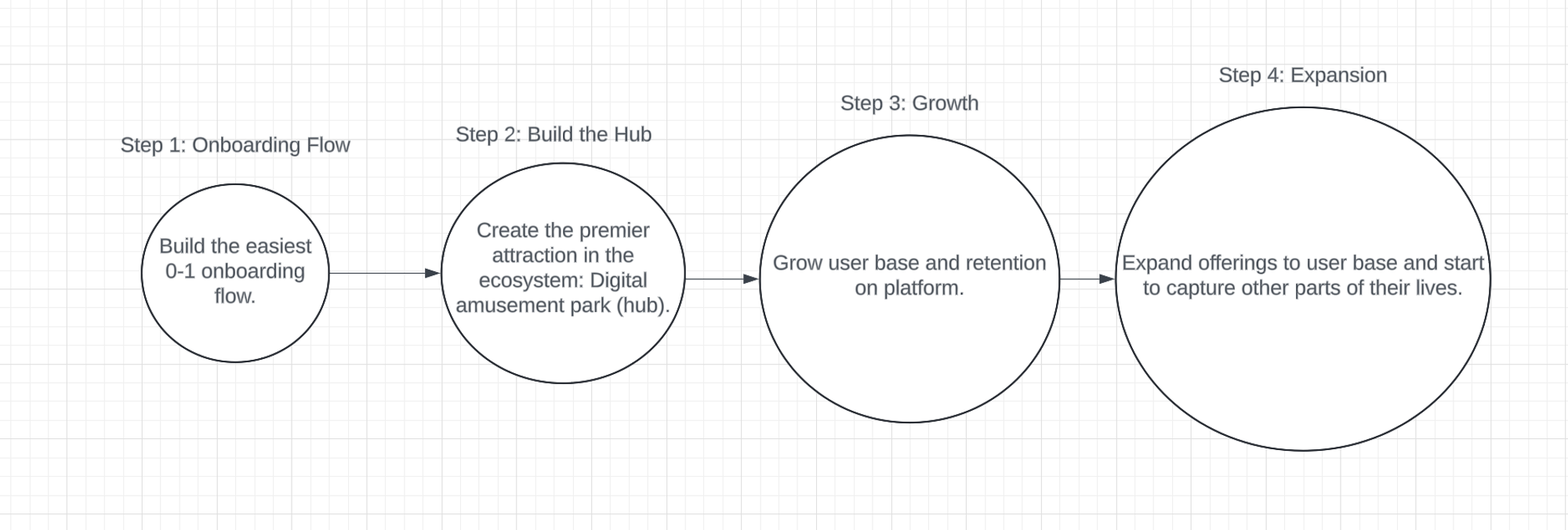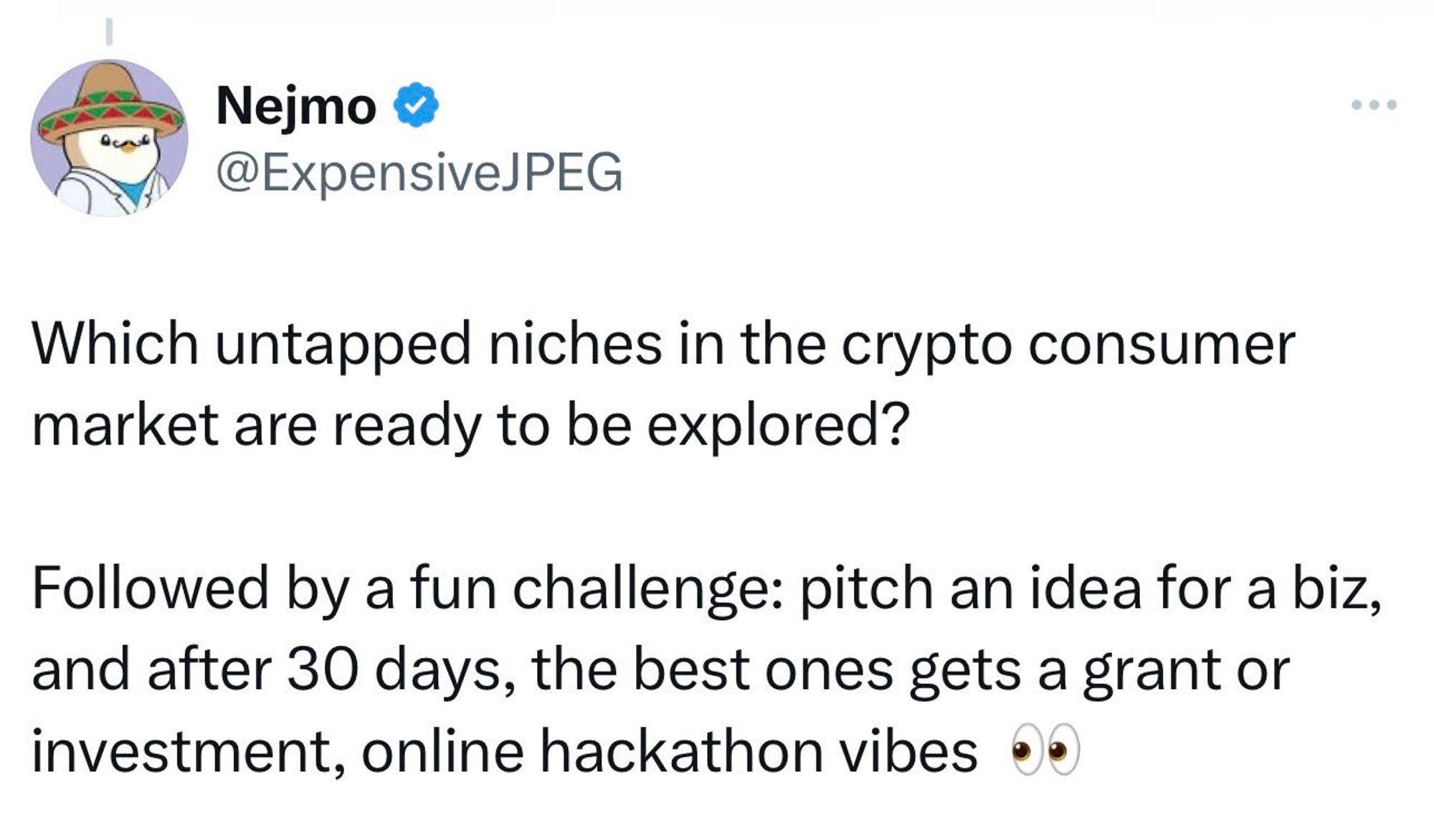Why is consumer-grade encryption the industrys last blue ocean?
Original author: Luca Netz
Original translation: TechFlow
In this article, I want to explore my understanding of consumer encryption, why we haven’t yet achieved widespread adoption, and why I believe consumer encryption is the last great piece of the puzzle.
What is consumer-grade encryption?
I define consumer crypto as blockchain-powered applications being used by billions of people in their daily lives. However, this definition is broad, and to be more specific, I believe that consumer crypto adoption will go through three phases. I categorize each phase based on consumer habits:
-
Phase 1 : Discretionary Consumption
-
Phase 2 : Necessary consumption
-
Stage 3 : Basic consumption
The following figure shows the relationship between each stage and user growth:
Discretionary consumption – first 50 million users
The initial phase of the consumer crypto revolution will focus on discretionary consumption — consumer-oriented businesses built around non-essential or leisure consumption, in other words, applications that occupy people’s free time. These applications will be the first to break through because they are more likely to go viral, easier to market to consumers, and built on the blockchain to solve problems that Web2 applications cannot handle.
Businesses focused on discretionary spending often have “fun” at their core. However, in consumer markets, “fun” often faces significant barriers to entry, such as payment processing issues, geographic restrictions, and regulations that prevent Internet businesses from scaling and growing. To illustrate this, we can look at the problems faced by some current consumer-oriented Web2 businesses that are facing challenges:
-
Fees : Conventional payment processors charge too much and give too much control over merchants. Typically, merchants pay 2.9% to 10% in transaction fees. The higher the risk (which is common in entertainment apps), the higher the fees.
-
Geographical limitations : It is relatively simple to do business in your own country, but it is very challenging to scale globally, especially when following the compliance requirements of different regions. Most applications cannot scale outside of their current jurisdiction. While the “fun” is global, unfortunately, the infrastructure of Web2 is not.
-
Chargeback Risk : Current Web2 applications are limited in the scale of consumption. Limitations set by processors prevent businesses from fully tapping the potential of their core users because these limitations prevent users from spending as much as they would like.
-
Scrutiny risk : Businesses may face scrutiny from their service providers, which could prevent them from aggressively expanding their business or achieving their full potential.
Building consumer applications around discretionary spending is the lowest hanging fruit in the consumer crypto ecosystem and will be the first to reach mass adoption as it becomes easier for entrepreneurs to build interesting products on the blockchain. To make this clearer, I believe the following consumer categories in the discretionary spending space are best suited for disruption:
-
game
-
Social (Creator Platform)
-
trade
-
casino
-
Betting
-
Digital Collectibles
-
Tokenization culture: transforming intangible assets into tangible, tradable, exchangeable and permanent assets.
I believe these categories have the potential to drive consumer crypto adoption to reach the first 50 million active users. To support this view, here are some of the most significant consumer crypto apps we are seeing today. Notably, they are all types of businesses that are aiming to capture a share of the discretionary consumer market:
-
OpenSea – Digital Collectibles
-
Topshot – Digital Collectibles
-
Polymarket – Betting
-
pump.fun – Social and Tokenized Culture
-
Uniswap – Trading
-
Rollbit – Casino
-
Pudgy Penguins – Digital Collectibles
-
Friendtech – Social
-
StepN – Social
-
Axie – Games
Necessary consumption – the path to 250 million users
Once the first 50 million users are reached, the focus will shift to gaining market share for essential consumption, integrating cryptocurrency into more aspects of life, not just for leisure time. Applications at this stage include the following categories:
-
DeFi
-
DePin
-
SaaS
-
Digital Media
-
Digital Commerce
-
Payment
Basic Consumption – The World on Chain
After breaking through the barriers of necessary consumption, we will usher in the widespread popularization of basic consumption. This means that consumer applications will be built around basic needs, allowing users to do everything on the chain that they can do off-chain. Examples include:
-
Online Banking
-
Credit
-
Tokenization (RWAs)
-
Insurance
-
data
-
Internet of Things
-
identity
-
vote
Given that the path to success is clear, why haven’t we achieved mass adoption yet? And how can we get there?
Question: Why haven’t we achieved breakthrough user adoption?
Over the past decade, the responsibility for driving consumer adoption has been borne by blockchain projects that have raised tens of billions of dollars. Unfortunately, only a few have succeeded in this process. I believe the reason lies in the philosophy they are built on. Many blockchain companies have adopted a general purpose strategy from zero to one hundred, ambitiously wanting to become the infrastructure of the next generation of the Internet economy. Below is a diagram of how general purpose blockchains grow and prioritize.
Universal blockchain:
The universal model presents a classic case of fragmentation, and unfortunately, mass market penetration and fragmentation do not go hand in hand. The universal approach is ambitious, but the effort required to achieve it is enormous. Therefore, teams that lack the necessary talent or resources when pursuing this approach are likely to face bankruptcy sooner, ultimately wasting time, energy, and resources that could have been used to achieve mass adoption.
Solution: Focus is the key to achieving mass adoption
I think of blockchains like cities, and like all cities, their demand is driven by the attractions and activities they offer. Therefore, I believe that the breakthrough in consumer adoption will come from teams focusing on building top attractions within their cities. Once you have an attraction that draws people into your ecosystem, you can build an entire city around it.
Consumer Specific Blockchains:
Given the above background, my assessment is that we have not yet achieved mass adoption not because of a lack of capabilities, but because we are not focused on the right approach. General-purpose blockchains and consumer-centric blockchains are not interchangeable. Building a consumer chain is not just a catchy slogan, but a fundamental goal and philosophy that has not yet been fully accepted. Recognizing this gap, we saw a unique opportunity in the blockchain space, which prompted Igloo to acquire the Frame team to help build Abstract.
Our team is committed to creating a top destination on the chain, one designed to be the most fun place on the Internet – I call it cryptos digital playground or Disneyland of the Internet. The following illustration highlights our firm determination to focus on providing an excellent 0-1 consumer experience, without distraction from other factors. Over time, we can gradually evolve into a general chain after we build a loyal user base by introducing new products covering all aspects of peoples lives. For us, this is a highly focused strategy of achieving specific success first and then expanding, which is more advantageous than the fragmented approach of general chains.
Abstract’s path to success:
Consumer crypto is the last great frontier for cryptocurrency
The cryptocurrency market today is similar to the dot-com boom of the early 2000s. In the first decade of that era, innovative infrastructure companies emerged, but only a few were able to achieve widespread adoption. Over time, only those that achieved breakthrough adoption survived and thrived. Cryptocurrency is at a similar juncture today. After 10 years of infrastructure building, the industry needs to move toward mainstream adoption.
Yet, public opinion around cryptocurrencies is extremely fragile. Currently, the space is in danger of being seen as a safe haven for gambling and risky financial behavior. As more and more people suffer losses, the impression that cryptocurrencies are a scam targeting degenerate gamblers is slowly taking shape in the public consciousness. While this may sound like a joke to veteran crypto users, it is a very real concern to the general public, and unfortunately, this is exactly the mainstream view of cryptocurrencies at the moment. I am concerned that if we cannot achieve mass adoption in a meaningful way in the near future, the potential of the entire industry may be limited. Therefore, I believe that consumer crypto is the most critical and final frontier in the life cycle of cryptocurrencies.
Community Issues
To wrap up this post, I asked my X community if they had any questions about consumer encryption. Here are some of the questions they asked and my responses.
Question 1
Nejmo @ExpensiveJPEG: What untapped niches are worth exploring in the crypto consumer market?
Answer: Touchability.
One of the big breakthroughs of tokenization is the ability to make the intangible tangible. One of the big potential innovations of cryptocurrency could be to influence and extract value from culture through tokenization. Let me explain: Since ancient times, investors have always tied their investment percentage to actual value, price-to-earnings ratios, or future forecasts. It wasnt until the advent of cryptocurrency that symbolic value became a new concept, but until now, I havent heard anyone describe it this way. To me, a new asset class has been unlocked, which marks a paradigm shift where the intangible parts of culture can now become tangible. I think the biggest opportunity for tokenization is to tokenize influence and ultimately make influence tangible. In the past, we have seen products like bitclout, friendtech, etc. that have tried to crack this problem. However, I dont think any of them have really succeeded. In my opinion, if pump.fun can be combined with Bitclout, Polymarket, and products like Instagram, this could become one of the most valuable companies in the cryptocurrency space.
Question 2:
Fifi @fifilechien: Is it really more efficient to create a completely new product than to improve an existing one?
Answer: Don’t reinvent new technology just yet.
Developers in crypto often try too hard to reinvent the underlying technology. There are breakthrough consumer products today that could scale tenfold if they leveraged crypto’s infrastructure and incentives. Rather than trying to create an entirely new model, crypto-ify an existing one. I believe there are many consumer crypto applications that have yet to be developed, and their Web2 versions are waiting for huge growth potential to be unlocked through crypto.
This article is sourced from the internet: Why is consumer-grade encryption the industrys last blue ocean?
Related: A comprehensive explanation of Zentry: an open gaming universe connecting Web2 and Web3
Original source: blocmates In the Web3 field full of innovation and opportunities, Zentry, an open gaming universe connecting Web2 and Web3, is committed to creating a unique ecosystem that seamlessly integrates traditional games and blockchain technology to provide players with a brand new gaming experience. GuildFi is making a strong comeback and has fully upgraded its brand to Zentry. This is not just a normal rebranding, or changing the name and logo to get a new roadmap and increase the price of the coin. This is a disruptive transformation of a project, combining the previous advantages with a whole set of new products and features, making Zentry not only the core position of Web3 games, but also a bridge connecting the Web2 and Web3 game worlds. After speaking with Zentry…














